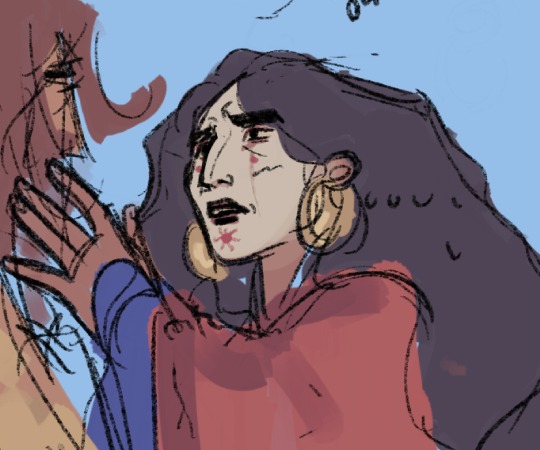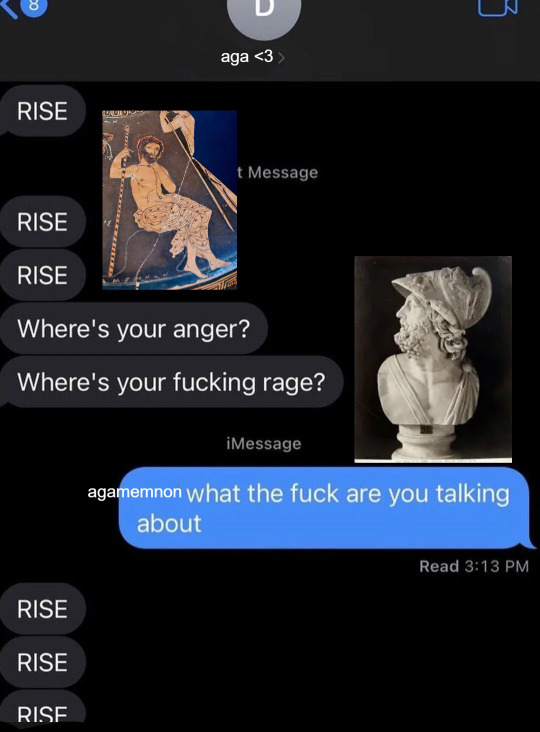vick �� she/her • argentinian • hector of troy enthusiast • i love magi, asoiaf and hozier currently reading dunk and egg
Don't wanna be here? Send us removal request.
Text
i'm still mad about that post thats like "humans USED to be able to memoriize long epic poems, but we no longer have Bards so our memories arent as good" boy shut the fuck up. a good chunk of people i went to high school with had the entirety of hamilton memorized for fun and they weren't even autistic.
80K notes
·
View notes
Text




what's meant to be is meant to be. if you even care.
(pls click for higher res i worked really hard on this)
11K notes
·
View notes
Text



Teaching Hector about her namesake
7K notes
·
View notes
Text
🌍✨ A Voice from Gaza: Fighting for Hope ❤️🩹
Hi, my name is Mosab , and I’m from Gaza. Life here has been harder than I could ever imagine, but today I’m sharing my story with hope in my heart, because your kindness has already given us so much strength.
This journey hasn’t been easy. The war has taken 25 family members from us—25 beautiful souls we loved deeply. Their laughter, their presence, their love… all of it is gone, leaving behind memories that are both precious and painful. Every day, I carry the weight of their loss, but I also carry their spirit, which gives me the strength to keep going.



Our Journey So Far
When I first reached out, I couldn’t have imagined we’d make it this far. Thanks to your incredible kindness, we’ve reached 20,020 out of 30,000. Your support has been a light in these difficult times, and we are so deeply grateful for every single contribution.
But the road ahead is still challenging. Every day, we’re reminded of how much we’ve lost and how much we still need to rebuild.
Here’s what life in Gaza looks like for my family right now:
🏠 Safety: The uncertainty of tomorrow weighs heavily on us.
😢 Loss: The absence of the 25 family members we’ve lost is a pain we carry every moment.
💔 Dreams on Hold: The future feels so far away when survival takes all our strength.
How You Can Help Us Cross the Finish Line
Even the smallest act of kindness can make a difference:
$5 might not seem like much, but it could mean a meal, clean water, or a tiny bit of hope for my family.
Can’t donate? Reblog this post to help us reach someone who can. Every share matters more than you know.
Why Your Support Matters
Your kindness isn’t just about helping us meet our goal—it’s about reminding us that we’re not alone in this fight. It’s about hope. It’s about survival. And it’s about giving my family a chance to rebuild our lives, even in the face of unimaginable loss.
Thank you for helping us get this far. Your generosity and compassion have already brought us closer to a better tomorrow, and for that, I’m endlessly grateful.
With all my love and gratitude,
Mosab and Family ❤️
10K notes
·
View notes
Text


homophrosyne
1K notes
·
View notes
Text
Antinous rkgk

Getting a bit itchy from not drawing much the past week…
3K notes
·
View notes
Text


Helen and Menelaus doodles cause I can't get them out of my head, my sweet cheeses you didn't deserve this.
904 notes
·
View notes
Text

this happened homer told me himself
680 notes
·
View notes
Text

helen and menelaus for a saturnalia gift exchange :D I don't have a proper helen design yet but hehe menelaus tall
5K notes
·
View notes
Text
please remember that a ceasefire has not been reached yet and that israel's attacks have actually recently ramped up. people are also still being starved. combat this by donating to gaza soup kitchen

edit that i was asked to make: you can also donate to @/olasfamily and @/amalshour here
20K notes
·
View notes
Text
The real issue is whether indeed there can be a true representation of anything, or whether any and all representations, because they are representations, are embedded first in the language — and then in the culture, institutions, and political ambience of the representor. If the latter alternative is the correct one (as I believe it is), then we must be prepared to accept the fact that a representation is eo ipso implicated, intertwined, embedded, interwoven, with a great many other things besides the "truth" which is itself a representation. … Thus each individual contribution first causes changes within the field and then promotes a new stability, in the way that on a surface covered with twenty compasses the introduction of a twenty-first will cause all the others to quiver, then to settle into a new accommodating configuration.
— Edward W. Said, from Orientalism (1978.)
251 notes
·
View notes
Text




— red blue dilapidated study space — ⋆˙
168 notes
·
View notes
Text
There is nothing mysterious or natural about authority. It is formed, irradiated, disseminated; it is instrumental, it is persuasive; it has status, it establishes canons of taste and value; it is virtually indistinguishable from certain ideas it signifies as true, and from traditions, perceptions, and judgments it forms, transmits, reproduces. Above all, authority can, indeed must, be analyzed.
Orientalism by Edward Said
1K notes
·
View notes
Text
“Battered and wrecked, I come to you, you first—”
— Homer, The Odyssey (tr. by Emily Wilson)
3K notes
·
View notes
Text

Sketch
4K notes
·
View notes
Text
So another interesting thing about Jane Eyre is its take on relationship inequality.
Like, Jane is 18 at the beginning of the story and Rochester is said to be something like 35-38. And it's not casually brushed aside like that was normal back in the day. It wasn't. Concerns about the age gap are raised within the text. But the story emphasizes that Jane feels comfortable accepting Rochester's proposal, despite the age difference, the class difference, and him being her boss, because Jane feels that Rochester regards her as an equal. When they converse, Jane doesn't feel any tension, like she has to impress him or try to read his mind and say whatever he wants to hear. She feels that he respects her and values her thoughts and isn't compelled to use his power against her if she says something to displease him. Around the midpoint of the story, Jane believes that Rochester is going to marry another woman, and resolves to leave because she's heartbroken, believing that because she is poor and plain Rochester can't possibly be as hurt by their parting as she is, and he'll forget her and move on long before she does. But it turns out to be the opposite. After finding out about Bertha, Rochester begs Jane to stay and insists he'll be miserable forever without her, while Jane, still thinking she's too poor and plain to ever attract someone like him again, resists all temptation and leaves him. And she does this specifically because she feels that if she were to compromise her morals and self-respect to be Mr. Rochester's mistress, then he would lose respect for her and the relationship would fall apart. It was only by maintaining her integrity that the relationship could stay in-tact when the reconciled at the end.
St. John Rivers on the other hand, I don't think is given a definite age, but I think he's intended to be a much younger man, probably in his early 20s. He is poor and without relations aside from his sisters or any other connections, just as Jane. Jane finds out they're actually cousins at the same time she learns she's come into a vast fortune that was willed to her rather than the Rivers, but decides to share her fortune equally with them. So she arguably had more social capital, even though she made an effort to put St. John on equal footing with her, because the money was hers by right and she could've presumably cut him off at any time, just as easily as Rochester could've terminated Jane from her job.
And yet, Jane's relationship with St. John is vastly more unequal than her relationship with Rochester. Even though Jane practically worshiped Rochester but only cares for St. John as a brother and is acutely aware of his faults, she still finds herself desperately craving his approval in a way she never did with Rochester. And St. John is willing to exploit that intentionally. He asks her to do things she doesn't want to and make sacrifices for him just because he knows she'll do anything to please him, and that's why he thinks she's the perfect wife for him. Where Rochester tries to explain himself and persuade Jane not to leave him by addressing her concerns, St. John basically tries to command Jane to marry him and refuses to accept her "no" as final. He withholds affection from Jane as a tactic to get her to compromise in order to reconcile with him when he's the one who should be apologizing to her and considering her needs and not just his own. Jane knows that she can't ever be happy with him because he doesn't respect her and his lack of respect only makes her want to seek his approval, which he is all too happy to exploit for his own benefit.
But Jane ultimately stays firm and rejects St. John's proposal of a loveless marriage, just as she rejected Rochester's proposal of an unlawful marriage, because both situations were doomed to fail if she didn't put her own self-respect first.
So this novel from 1847 was really saying that power dynamics aren't pure black and white. Age and class and wealth and status can be a factor in making a relationship unequal, but you can also be equal on pretty much all social axis and still have inequality in a relationship. What's really important is that there's mutual respect.
3K notes
·
View notes
Text
In 1847 the stereotypes for male and female writers were very rigid. Critics expected from a male writer strength, passion, and intellect, and from a woman writer they expected tact, refinement, and piety. They depended on these stereotypes so much, in fact, that they really didn't know how to proceed, what to say, or what to look for in a book if they were unsure of the author's sex.
So Jane Eyre created a tremendous sensation, and it was a problem for the Brontës. The name Currer Bell could be that of either a man or a woman and the narrator of Jane Eyre is Jane herself. The book is told as an autobiography. These things suggested that the author might have been a woman. On the other hand, the novel was considered to be excellent, strong, intelligent and, most of all, passionate. And therefore, the critics reasoned, it could not be written by a woman, and if it turned out that it was written by a woman, she had to be unnatural and perverted.
The reason for this is that the Victorians believed that decent women had no sexual feelings whatsoever—that they had sexual anesthesia. Therefore, when Jane says about Rochester that his touch "made her veins run fire, and her heart beat faster than she could count its throbs," the critics assumed this was a man writing about his sexual fantasies. If a woman was the author, then presumably she was writing from her own experience, and that was disgusting. In this case we can clearly see how women were not permitted the authority of their own experience if it happened to contradict the cultural stereotype.
But even more shocking than this to the Victorians was Jane's reply to Rochester, a very famous passage in the novel. He has told her he is going to marry another woman, an heiress, but that she can stay on as a servant. Jane answers him thus:
"I tell you I must go," I retorted, roused to something like passion. "Do you think I can stay to become nothing to you? Do you think I am an automaton, a machine without feeling and can bear to have my morsel of bread snatched from my lips and my drop of living water dashed from my cup? Do you think because I am poor, obscure, plain and little, I'm soulless and heartless? You think wrong. I have as much soul as you and full as much heart. And if God had gifted me with some beauty and much wealth, I should've made it as hard for you to leave me as it is now for me to leave you. I am not talking to you now through the medium of custom, conventionality, nor even of mortal flesh. It is my spirit that addresses your spirit, just as if both had passed through the grave and we stood at God's feet equal—as we are."
This splendid assertion violated not only the standards of sexual submission, which were believed to be women's duty and their punishment for Eve's crime, but it also went against standards of class submission, and obviously against religion. And this sort of rebellion was not feminine at all.
The reviews of Jane Eyre in 1847 and 1848 show how confused the critics were. Some of them said Currer Bell was a man. Some of them, including Thackeray, said a woman. One man, an American critic named Edgar Percy Whipple, said the Bells were a team, that Currer Bell was a woman who did the dainty parts of the book and brother Acton the rough parts. All kinds of circumstantial evidence were adduced to solve this problem, such as the details of housekeeping. Harriet Martineau said the book had to be the work of a woman or an upholsterer. And Lady Eastlake, who was a reviewer for one of the most prestigious journals, said it couldn't be a woman because no woman would dress her heroines in such outlandish clothes.
Eventually Charlotte Brontë revealed her identity, and then these attacks which had been general became personal. People introduced her as the author of a naughty book; they gossiped that she was Thackeray's mistress. They speculated on the causes of what they called "her alien and sour perspective on women." She felt during her entire short life that she was judged always on the basis of what was becoming in femininity and not as an artist.
-Elaine Showalter, ‘Women Writers and the Female Experience’ in Radical Feminism, Koedt et al (eds.)
2K notes
·
View notes